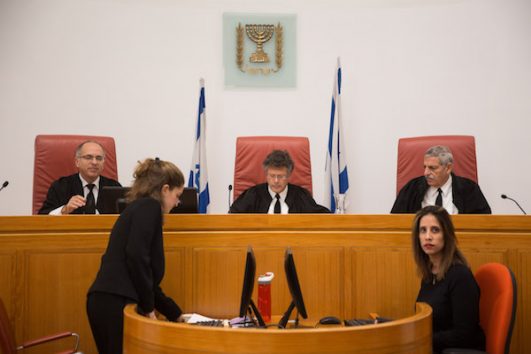The Israeli government is pushing a law that would force judges to prioritize Israel’s Jewish character over democratic principles. But that has always been the case.

The “Jewish Nation-State Law,” which is currently making its way through the Knesset as a proposed Basic Law – the closest thing Israel has to a constitutional amendment – would require the High Court to prioritize Israel’s Jewish nature over democratic principles in its rulings, according to Haaretz.
The bill asserts that the justices of the highest court in the land must interpret Israeli law with the understanding that the right to self-determination in Israel is “unique to the Jewish people,” and with the aim of “protecting Israel’s status as the nation-state of the Jewish people.” Similar versions of the same bill have stalled in the legislative process in recent years.
The Netanyahu government seems to have a fondness for redundant laws. Contrary to popular belief, the High Court of Justice has hardly been a guarantor of democratic rights in Israel — particularly for its non-Jewish citizens and subjects. From legitimizing countless aspects of the occupation to limiting citizens’ freedoms, the court has acquiesced to most of the government’s discriminatory positions for decades, serving as a rubber stamp to preserve Jewish supremacy and state power.
When insisting on sidelining fundamental democratic values, perhaps the government forgot how the court has repeatedly upheld an order that bans Palestinian family unification. In his 2012 judgment on the inherently discriminatory law, then-court president Asher Grunis wrote: “Human rights are not a prescription for national suicide.”

Or perhaps the government dozed off in court in 2015, when in his decision upholding the Anti-Boycott Law – a direct assault on the principle of free political expression – Justice Elyakim Rubinstein cited the Passover Haggadah and endorsed the Knesset’s effort to “ensure the survival of the Jewish people” by combating BDS.
Maybe the Knesset members missed the news in January 2016, when High Court President Miriam Naor refused to reconsider the planned demolition of Umm al-Hiran, a Bedouin village in the Naqab (Negev), in order to build a Jewish town over its ruins; she didn’t think the case was “exceptionally exceptional, the rarest of rare, to warrant another hearing.”
They most certainly didn’t read the court’s decision last week refusing to demolish the homes of Mohammad Abu Khdeir’s murderers, as Israel does to the family homes of Palestinian attackers. According to Justice Neal Hendel, the policy is not necessary to deter Jewish terrorists like Palestinian ones because the former are “a minority of a minority of a minority.”
The numbers further prove that the court is no adversary of Israel’s political leaders: according to a study of 9,490 cases from 1995 to 2016, the court dismissed 87 percent of petitions filed against government laws and decisions. Even Aharon Barak, who spearheaded Israel’s “constitutional revolution” of the 1990s, rejected 84.2 percent of such petitions.
The few occasions in which the court has ruled against the government, and to which right-wing politicians responded with furor — such as the demolition of the Amona outpost and consecutive orders to shut down the Holot detention center — may have felt like political earthquakes in the moment, but ultimately did nothing to thwart the underlying policies.

So why does the Knesset want the new law? One reason, as always, is politics. The right wing likes to claim that the High Court is undermining or weakening Israel’s settlement enterprise, security apparatus, and other signature policies, in order to galvanize their constituents’ support. Another more ominous reason is that the Knesset’s political agenda is about to get even worse – more racist and more anti-democratic – and so the right wing wants to ensure, by re-writing the legal framework within which it operates, that the court will continue to side with its positions.
Enshrining a “Jewish preference” provision is therefore one step to securing the judges’ obedience. In parallel, Justice Minister Ayelet Shaked has demanded more authority to appoint High Court justices of her ideological ilk, while encouraging more laws to curb the court’s power. All this is in addition to the aim of the Jewish nation-state bill as a whole: to erase, on a constitutional level, any ambiguity about Jewish primacy in all fields of life in Israel.
The High Court, of course, has its many nuances and internal disputes. But the myth of a fundamental clash between the government and the judiciary, and the belief that Israel has a healthy system of checks and balances, distracts from the fact that there is more that unites the two bodies than divides them.
Moreover, the court’s nuances have done little for the people who suffer most from its rulings – Palestinians in the occupied territories and Palestinian citizens of Israel, along with non-Jewish refugees and asylum seekers, and, increasingly, dissenting Jewish-Israelis. No one should be fooled into believing that democracy is being threatened by this new law; for a large number of Israel’s subjects, democracy has never actually existed.

